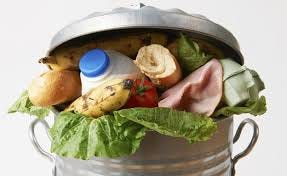Highlights from EconoMe 1: Bryan Suddith’s Zero Waste Challenge
How much money are you throwing away?
In mid-March, I attended EconoMe in Cincinnati (actually a pretty cool city). It was my first time going to this conference for the FIRE community, and I gotta say it was really eye opening. I came away from it with lots of insights to apply to my life and I want to share some of those with you. This post is going to focus on Bryan Suddith’s mainstage discussion on food waste.
Bryan opened his talk with a question: “What would you do with an extra $3200 a year?”
Sounds like the budget for a great vacation to me.
Well according to various studies the average American household spends about 10k at the grocery store each year and throws away about 32% of that. There’s lots of nuance to these studies, as this Reddit post points out, but I don't want to get dragged down into that.
The heart of the matter is that we are not only wasting tons of food each year, but we are throwing money directly into the garbage. Money that could be better spent on vacations, concerts, education, or on investments for the future.
As Bryan pointed out “You would fix a leak in your roof or your basement” so why are we ignoring the one in kitchens?
Luckily for us, Bryan has done a lot of the hard work and is here to show us the way. Starting in 2020, he tracked all the food waste in his household. Their end of the year total: about $30.
When I first heard that, I actually thought he meant per month, and I was impressed. But $30 for the whole year? My jaw was on the floor. Later on in his presentation, he shared his numbers through 2024 and you can probably guess how I was feeling.
I’ve never tracked my food waste and while I try to be frugal and mindful, these numbers seem impossible for the average person to get to. Lucky for us, Bryan shared a few simple steps and some guidelines that anyone can follow to get their food waste under control.
The Process
Planning
How long are you shopping for?
How many meals (and portions) do you need to make during that time?
What meals are you preparing to make?
What is needed for the meals you are planning?
What do you have on hand that can be used in those meals?
How will you need to modify those meals in order to use things that you have on hand that are expiring soon?
Intentional shopping
Shop based off the plan
No overstocking
No hoarding
Limit impulse purchases
Meal Prep
Create the meals based on the plan
Have a plan for how to use leftovers before they become a problem to solve
Tracking
Leverage a visible, easy to use method
Track every food purchase
Track all food waste
Guidelines
Don’t overstock or hoard: If you can’t see it in the fridge or panty, you are going to forget about it. There’s no need to buy outsized amounts of products just because they are on sale. They are going to go bad before you get them.
Understand product shelf lives: Get to know what has to be used quickly and what can keep for several weeks or longer. Hint: Berries, bagged salads, and cucumbers go bad pretty quickly. Here’s a few good resources to start learning more: Shelf Life Guide from the LA Food Bank, Foodkeep App from FoodSafety.gov.
Re-imagine leftovers: They can be something different in the future. They can be used as an ingredient in an upcoming dish or as a side (as he pointed out, mashed potatoes can go well with tacos if you try).
Re-home leftovers: No cookware in the fridge. Move all leftovers to a new, clean container so that they are more attractive and easier to use in the future.
Be mindful of your eating habits: Don’t get so locked into what meals ought to look like or how they are traditionally defined. Foods are fungible. Anything can be breakfast, lunch, or dinner. Not every meal has to come out instagram-perfect. Recognize when aspirational shopping is leading to waste. Are you buying exotic ingredients for trendy meals that you never end up cooking? I know we’ve done that. When it comes to impulse purchases, figure out how to incorporate them into your meal plan before leaving the store.
Moving Forward
Now I’ve considered food waste from a moral standpoint for awhile, but Bryan’s talk was the first time the financial implication really hit me. How much money am I really throwing out in the trash each month?
I wish I could say that I know. But that would be a lie.
I get the feeling that number is pretty big. Much bigger than what Bryan’s family is putting out anyway (they got it under $4 in 2023).
What I do know is that I’ve got tons of ideas for what I’d like to be doing with that money and thanks to Bryan I know how to get a handle on this.
Thanks for taking the time to read this post. Let me know what you’re taking away from the discussion. How big is the leak in your kitchen? What are you doing to keep your money out of the trashcan?
My Substack is free but if you feel like buying me a coffee that’d be nice!




Great advice! I have plenty of people I'm going to share it with. Thanks, Joe!